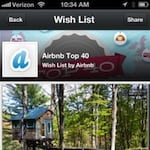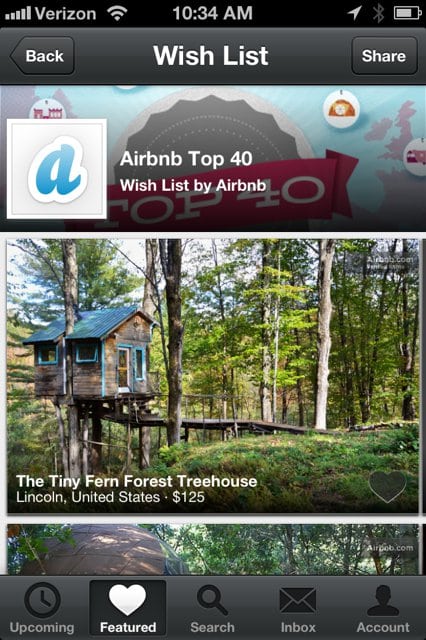Skift Take
The peer-to-peer rental movement already is transforming the lodging industry, and mobile adoption, as evidenced by the Airbnb statistics, will help bring it more into the mainstream.
Airbnb is now getting more than a fourth of its traffic from mobile, and the rental-sharing site is using this burst in smartphone usage to solve a major dilemma — hosts who wait for days to respond to potential guests’ booking inquiries.
In fact, Airbnb, which says its iPhone app, launched in late 2010, has now been downloaded more than 1 million times, says users’ messages get responded to three times faster on mobile than over the Web.
Airbnb users, hunting for short-term apartment, vacation home and houseboat shares, sent more than 530,000 messages on its mobile platform in August, the company says — at a clip of about a message every five seconds.
So mobile users are less apt to be forced to wait for days after sending a host questions about the property’s availability, costs and amenities because the hosts receive push notifications and can respond with their mobile devices on hand.
“It’s a similar concept to why there were more successful phone calls once people moved from land lines to mobile phones,” says Andrew Vilcsak, who leads Airbnb’s mobile efforts. “It’s easier for hosts/guests to respond to messages via mobile because they receive push notifications and text messages to alert them that a message has been received.”
“Further, Vilcsak adds, “once they get the message they have a mechanism to respond in hand, so they are naturally more fast.”
Missing in action hosts have long been a frustration for potential guests, and that’s a phenomenon that travelers seldom have to put up with when booking hotels.
Airbnb’s mobile prospects versus Facebook’s
Consider how the mobile upsurge will boost investors’ hopes for Airbnb when it gets around to an IPO while mobile adoption is dragging public company Facebook down, in some respects, because Facebook is finding it more difficult to monetize advertising over mobile compared with the Web.
Airbnb’s business model, on the other hand, is not dependent on advertising or listings’ fees. Instead, while hosts list their rentals for free, Airbnb collects 3% of every completed reservation from the hosts, and another 8% to 12% from the guest.
While more than half of Airbnb’s traffic is now generated from users wielding iPhones and iPads, the company’s number of iOS downloads, 1 million, is still relatively small. Travel search company Kayak, which debuted its first app a year and a half before Airbnb, in March 2009, has attracted more than 17 million downloads of its various apps, for example.
Still, the burst in mobile usage will drive Airbnb’s business, and its easy to use iPhone app will undoubtedly boost revenue from its cut of the transactions.
In Airbnb we trust?
The app also does much to help Airbnb in one of its biggest challenges — engendering trust between potential guests and hosts.
The iPhone app enables guests to verify their phone numbers, Facebook profiles and to upload Facebook profile photos, for example. And hosts can also verify their phone numbers; Facebook, Twitter and LinkedIn Profiles, and display whether they get positive reviews from users.
Some of the properties displayed on Airbnb are also getting “verified photos” designations, meaning Airbnb photographers have visited the properties and taken the photos.
Tonight-only rentals
Meanwhile, just as Hotel Tonight, Priceline, and LastMinute.com are doing, Airbnb is now trying to cash in on the tonight-only booking craze, which is especially useful for mobile guests.
When starting a search on the Airbnb iPhone app, users are prompted to tap an arrow stating, “Help, I need a place tonight,” and then they are directed to rentals available for that evening — in theory, at least.
From there, would-be guests view properties available that evening, can select one, view tonight’s date already filled in, and tap to book the rental.
However, the process isn’t as simple as with the tonight-only hotel booking apps. In the Airbnb scenario, the guest first has to message the host to ensure the rental is actually available for that evening before being enabled to book.
And, if the host has a smartphone within in reach, an answer presumably won’t take too long to receive.
Below are Airbnb’s numbers on the upsurge in mobile adoption.
Dwell Newsletter
Get breaking news, analysis and data from the week’s most important stories about short-term rentals, vacation rentals, housing, and real estate.
Have a confidential tip for Skift? Get in touch
Tags: airbnb, smartphones


